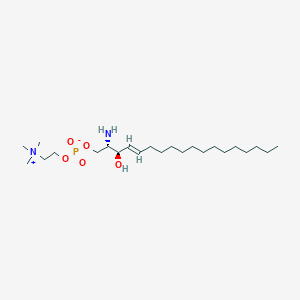sphingosylphosphorylcholine
sphingosylphosphorylcholine is a lipid of Sphingolipids (SP) class. Sphingosylphosphorylcholine is associated with abnormalities such as Cerebral Vasospasm, Subarachnoid Hemorrhage, Atherosclerosis, Hypertensive disease and Niemann-Pick Diseases. The involved functions are known as MAP kinase kinase activity, JUN kinase activity, Phosphorylation, biphenyl synthase activity and Cell Death. Sphingosylphosphorylcholine often locates in Adipose tissue, Protoplasm, Body tissue, Membrane and Extracellular. The associated genes with sphingosylphosphorylcholine are UCN3 gene, MAPK9 gene, JUN gene, NAA50 gene and P4HTM gene. The related lipids are Lysophospholipids, lysophosphatidic acid, Lysophosphatidylcholines, Sphingolipids and Saponin. The related experimental models are Mouse Model.
References related to genes published in Circ. Res.
| PMID | Journal | Published Date | Author | Title |
|---|---|---|---|---|
| 12142337 | Circ. Res. | 2002 | Somlyo AV | New roads leading to Ca2+ sensitization. |
| 12142343 | Circ. Res. | 2002 | Shirao S et al. | Sphingosylphosphorylcholine is a novel messenger for Rho-kinase-mediated Ca2+ sensitization in the bovine cerebral artery: unimportant role for protein kinase C. |
| 10571530 | Circ. Res. | 1999 | Sekiguchi K et al. | Sphingosylphosphorylcholine induces a hypertrophic growth response through the mitogen-activated protein kinase signaling cascade in rat neonatal cardiac myocytes. |
| 16825579 | Circ. Res. | 2006 | Morikage N et al. | Cholesterol primes vascular smooth muscle to induce Ca2 sensitization mediated by a sphingosylphosphorylcholine-Rho-kinase pathway: possible role for membrane raft. |
| 18688043 | Circ. Res. | 2008 | Jeon ES et al. | A Rho kinase/myocardin-related transcription factor-A-dependent mechanism underlies the sphingosylphosphorylcholine-induced differentiation of mesenchymal stem cells into contractile smooth muscle cells. |
